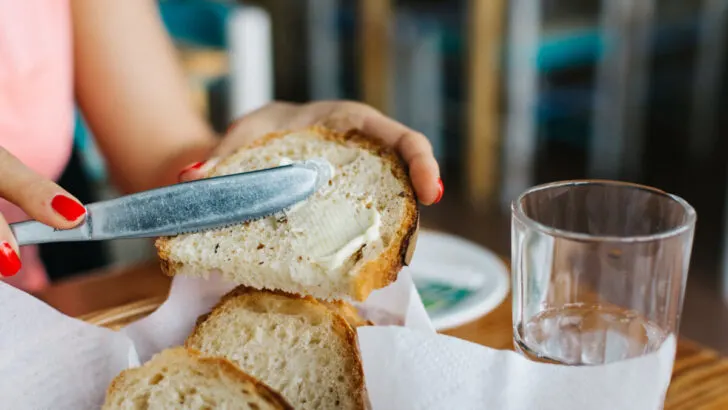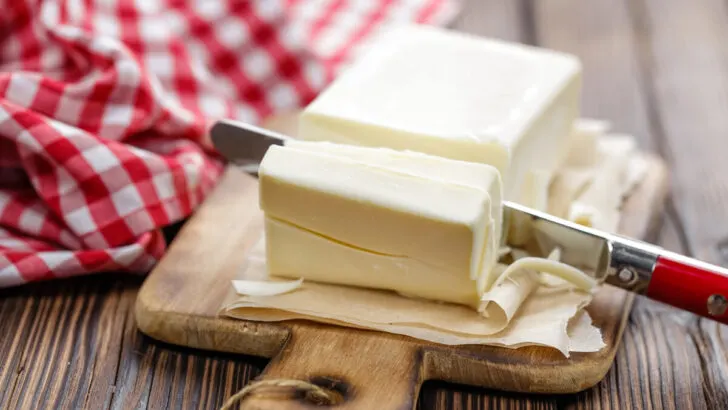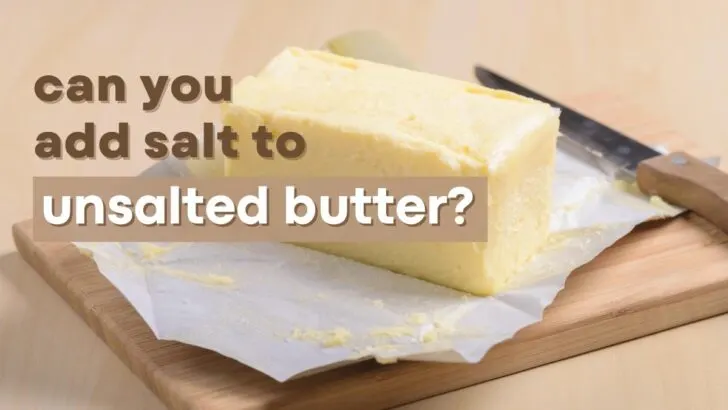Did you just get your hands on a new recipe and are now in the kitchen making the dish? But there’s one catch! You only have unsalted butter, and the recipe calls for salted butter.
Don’t worry though, as there is a way to work around this! You can still make your dish perfectly!
If you accidentally got unsalted butter and the recipe asks for salted butter, you can add a quarter of a teaspoon of salt per each stick (or half a cup) of your unsalted butter to make the authentic dish.
But is there a specific method for adding salt to your unsalted butter, or are there any considerations you must take before adding salt? Worry not! We are here to walk you through it.
Steps For Adding Salt To Unsalted Butter
Determining the amount of salt to use in your recipe is essential. To salt your unsalted butter, follow these instructions:
- The butter must be softened by bringing it to room temperature
- Move the unsalted butter to a mixing bowl once it has softened
- For every stick (or half cup) of unsalted butter, add 1/4th teaspoon of salt
- The unsalted butter and salt should be thoroughly combined
- If you are concerned that the butter will be overly salty, add less than 1/4th teaspoon of salt for each stick of unsalted butter and then taste the mixture. Then, if necessary, add extra salt.
Now, you finally got the salted butter, and your loved one doesn’t have to worry about dinner either. But there’s more to it.
We went the additional mile to provide you with more comprehensive information on the subject! You can learn more about butter and learn how to use it in the kitchen by continuing to read further.

A General Guideline For Salting Unsalted Butter
It may appear that you will not be able to salvage your dish if the recipe includes salted butter and you only have access to unsalted butter.
But fortunately, that’s not the case. However, remember that the maxim “less is more” applies here.
Your meal can always add additional salt, but the salt cannot be removed once it has been added. As too much salt might be damaging to your dish.
Why Does Salted Butter Exist?
Adding salt to butter is the only purpose of having the dish include more salt. However, it performs a few more things in addition to that.
Because salt is a naturally occurring preservative, adding it to the butter helps extend its shelf life.
However, to maintain the butter’s freshness and flavor, it is essential to keep it refrigerated, regardless of whether it is salted or unsalted.
If you store your butter in the freezer, it will maintain its quality for up to a year longer than if stored at room temperature.
What Kind Of Salt Should Be Used?
It may seem frightening to add the proper amount of salt to the butter, but first, you must choose the suitable salt from your kitchen cabinet.
Avoid using salt with larger flakes, like kosher salt. In layperson’s words, use table salt, because the aim is to melt the salt into the butter.
If not, your butter can end up with a salty snap. Sticking with regular table salt ensures that it melts nicely into the butter.
Table salt not only dissolves well, but it also facilitates accurate measurement. The secret to successfully salting unsalted butter is to use table salt and combine it with soft butter.
What Do You Do In Case You Don’t Have Regular Butter Or Unsalted Butter?
There are times when you could have a craving for a recipe that asks for butter, but you are out of the house, and your neighbors aren’t around to assist.
You might be able to find an appropriate butter substitute if you take a look around the kitchen.
There is no denying that butter can enhance a dish’s flavor.
Your body may appreciate you for choosing a healthier option. Olive oil, Greek yogurt, applesauce, and avocados are a few healthier butter substitutes.
Try different things, and you could find the ideal replacement for butter.
What happens if the situation is reversed and the recipe calls for unsalted butter, but you only have salted?
In such cases, the salt content must be reduced when using salted butter as a stand-in by employing the same ratio as above—1/4th teaspoon for a half cup of butter.
To put it another way, reduce the quantity of salt in your recipe by 1/4th teaspoon if you have salted butter instead of unsalted.

How Much Salt Is In A Cup Of Butter?
There is an estimated quantity of salt in a typical butter stick, yet there is no exact amount. Typically, 1.64 grams, or 1/3rd teaspoon, of salt can be found in a stick of butter.
Since some butter has more salt than others, this is an average number, as it can vary.
For instance, compared to Anchor Butter, Country Life Butter has 0.3 grams more salt. It’s ultimately up to you and your taste senses to decide which salty butter is best for you.
Is Unsalted Butter Different In Flavor?
Since unsalted butter isn’t salty, one would infer that it has a distinct flavor. This is accurate, but unsalted butter also has other, more delicious qualities.
Unsalted butter is renowned for its neutral flavor, creamy texture, and gentle sweetness in its purest form.
Which Type Of Butter Is Best For Baking?
We talked about how unsalted butter’s smooth and creamy flavor makes it ideal for baking, but we omitted to specify which brand you should use.
The best brands for butter in baking can vary based on your resources, preferences, and finances. Try several kinds of butter; whether salted or not, you’ll find something that suits you just as you see anything else you taste.
Final Words on Adding Salt to Unsalted Butter
Cooking and baking are all fun and games, but it also has the potential to feel like tiresome work at times. When life throws a wrench into your plans, like when you only have unsalted butter, but the recipe includes salt, sometimes improvisation (such as adding salt like the technique mentioned above) can still end in a pleasant meal at the dinner table.


